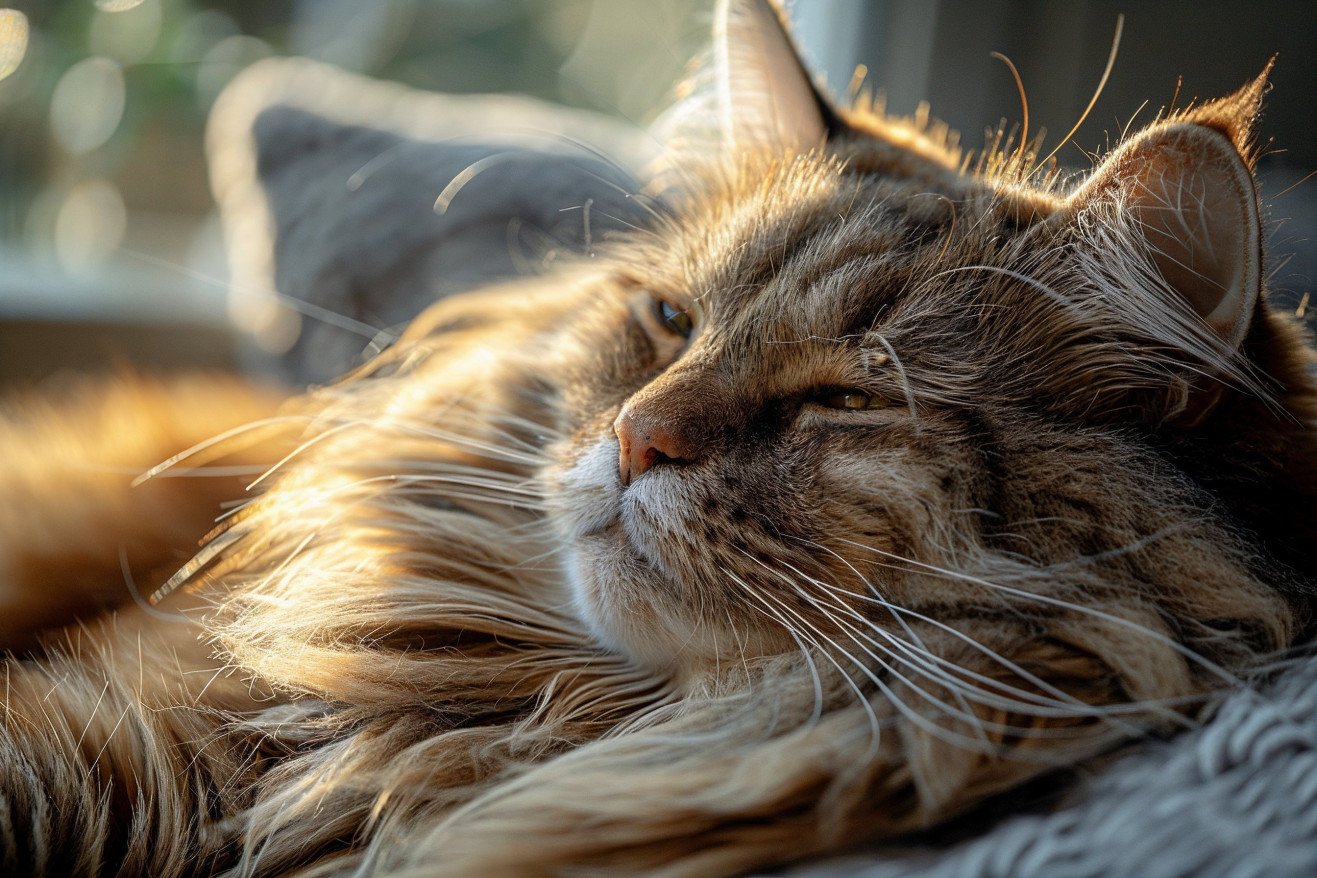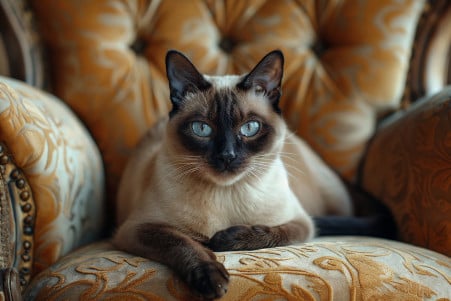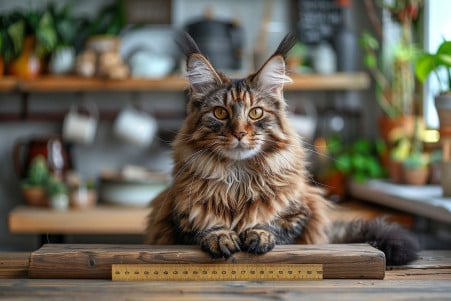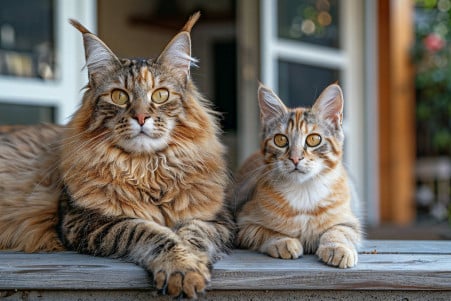Maine Coon Lifespan: Understanding How Long These Majestic Cats Live
29 February 2024 • Updated 29 February 2024

Big, beautiful, and long-lived, the Maine Coon cat is a breed that has a lot of myths surrounding it, including how long it lives. On average, Maine Coon cats live between 12 and 15 years. However, with the right care, which includes a balanced diet, regular vet check-ups, and keeping them indoors, some Maine Coons can live into their late teens and even early twenties.
This article will look at the lifespan of Maine Coons from a veterinary perspective, and also consider genetic, dietary, and environmental factors that can impact how long they live. By reviewing research from a number of veterinary and genetics studies, as well as input from cat care experts, we hope to give a thorough overview of the things that affect the health and longevity of these amazing cats.
How long do Maine Coon cats live?
Genetic Factors That Impact Lifespan
Genetic factors are one of the most important factors that impact the health and lifespan of Maine Coon cats. Hypertrophic Cardiomyopathy (HCM) and Spinal Muscular Atrophy (SMA) are two of the most common genetic disorders that impact their lifespan.
According to the Veterinary Hospital at North Carolina State University, about 30% of Maine Coons have the mutation for HCM, a heart disease that develops later in life. While not all cats with the mutation will develop the disease, cats with two copies of the gene are more likely to develop the condition.
Meanwhile, SMA, which is characterized by muscle atrophy and progressive weakness, is an inherited disease in Maine Coon cats. The Veterinary Genetics Laboratory at UC Davis explains that SMA is autosomal recessive, which means that kittens have a 25% chance of being affected if both of their parents are carriers of the mutation.
Genetic testing has become increasingly important in breeding. It allows breeders to find carriers of these mutations and prevent the mutations from being passed on to their offspring. By controlling genetic predispositions through selective breeding, breeders may be able to increase the lifespan of Maine Coon cats. Breeders can also make sure that this beloved breed stays healthy and strong in the future by paying close attention to genetics.
Diet and Maine Coon Longevity
A healthy diet is one of the key factors that can help Maine Coon cats live longer. Due to their large size and high energy levels, Maine Coons need a diet that is high in animal protein.
According to Maine Coon Central, a Maine Coon’s diet should be made up of at least 50% animal protein, which can come from a variety of sources, including chicken, pork, beef, and fish. This is consistent with the natural diet of Maine Coons, who are hunters by nature, according to A-Z Animals.
In addition, omega-3 fatty acids are important for Maine Coons. A study published in the Journal of Veterinary Internal Medicine and cited by A-Z Animals found that omega-3 fatty acid supplements can be used to help treat inflammatory conditions, which could help improve a Maine Coon’s overall health and longevity.
In addition, the Purina Institute notes that a 9-year longevity study showed that a specific combination of antioxidants, omega-3 fatty acids, and a prebiotic can increase a cat’s life expectancy by an average of one year. This study demonstrates the potential of personalized nutritional strategies to help cats, including the Maine Coon, live longer.
By making sure that their cats get enough high-quality protein and other essential nutrients, cat owners can help ensure that their Maine Coons are set up for long, healthy lives. As they work to find the right diet for their cats, they can work with their veterinarian to find a plan that meets their Maine Coon’s unique needs.
Making sure that their cats get the nutrition they need will help them live longer, healthier lives.
Maintaining a Healthy Maine Coon Environment
The environment and lifestyle choices play a big role in how long Maine Coon cats live. One of the most important decisions is whether to keep them indoors or let them roam outside. Keeping them indoors is much safer and can help them live longer.
As The Dodo explains, indoor Maine Coons are less susceptible to the predators, cars, and diseases that outdoor cats are, all of which can lead to a much shorter life.
It’s also important to make sure that Maine Coons are mentally stimulated. If they’re not, they can start to exhibit stress-related behaviors. Catster explains that things like hunting-like play are good for their mental health and well-being. In addition, climbing structures, interactive toys, and ‘catios’ can help them stay safe while still getting the mental stimulation they need.
Maine Coons also need human interaction. As Rover.com explains, socialization can help reduce anxiety and increase feelings of safety. Cats that are well-socialized and have a strong bond with their owner are more likely to lead fulfilling lives.
Overall, creating the right environment for Maine Coons is about finding a balance between safety, mental stimulation, and socialization. By making sure that their indoor environment is stimulating and that they have a strong bond with their owner, Maine Coon owners can help ensure that their cats are set up for a long and fulfilling life.
Managing Common Health Issues in Maine Coon Cats
Maine Coon cats are prone to a number of health problems that can impact their quality of life and longevity, including hypertrophic cardiomyopathy (HCM), hip dysplasia, and polycystic kidney disease (PKD).
HCM, which is a form of heart disease, is especially common in Maine Coon cats and can lead to heart failure and a shortened lifespan. Dr. Judy Morgan’s research notes that while there is no cure, it can be managed with medication and diet.
Meanwhile, Catster notes that hip dysplasia is a condition that many Maine Coon cats suffer from that can be managed with weight control and cause pain and limited mobility.
While regular veterinary care is important for catching these issues early, it can be especially important for managing these common health issues. MaineCoon.org explains that genetic testing, stem cell therapy, and weight management can all help manage and prevent these issues.
However, regular vet visits are also crucial for catching and managing these issues, which can help Maine Coon cats live longer, healthier lives. By staying on top of these issues and working with a vet to manage them, Maine Coon cat owners can help their pets live long, healthy lives.
The Ultimate Guide to Maine Coon Cat Care: How to Help Your Cat Live a Long, Healthy Life
After delving into the many factors that make up a Maine Coon cat’s life, it’s clear that a Maine Coon’s long life is the result of a combination of genetics, diet, environment, and medical care. These regal cats, which are known for their beautiful coats and sweet dispositions, usually live between 12 and 15 years, but with the right care, they can live even longer.
While a Maine Coon’s genetics can make them more susceptible to certain health issues, genetic testing and ethical breeding are helping to ensure that future generations of Maine Coons will be healthier.
Feeding them a diet that’s high in protein and other important nutrients is essential to their health and longevity. In addition, the right indoor environment that’s both stimulating and safe and regular human interaction are also important to their overall health and well-being.
Owners can also make sure that their Maine Coon lives a long life by taking them to the vet regularly for check-ups and other preventive care that can catch and treat issues early, which will help them live longer, healthier lives.
As people who care for these gentle giants, we take our roles as pet parents seriously. By following the best practices for Maine Coon cat care, we can ensure that our cats are happy and healthy and that we enjoy the deep bond and many benefits that come with caring for these regal animals.
Let’s raise a toast to the Maine Coon, not just for their physical beauty, but for the path of care that we share with them and that allows us to enjoy their company for years to come.


